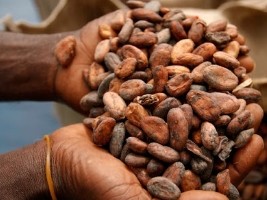|
||||||||||||||||||
| Download the revised decree and electoral calendar, published in the official journal |
|
|
Haiti - Agriculture : Cocoa from Haiti makes its mark internationally 29/12/2020 10:05:40
Although small compared to the giant producers of South America, Haiti is slowly developing its cocoa industry which provides better incomes to thousands of farmers. Haiti's annual production of 5,000 tonnes of cocoa is derisory compared to the 70,000 tonnes produced annually by our Dominican neighbors, but it should be noted that the development of this sector is more recent in Haiti. FECCANO a cooperative that now works with more than 4,000 producers in the North has become the first group in Haiti "Before, there was the systematic destruction of cocoa trees because the market price wasn’t interesting for farmers who preferred very short-cycle crops," said Guito Gilot, Feccano’s commercial director. "By fermenting its members’ beans before export, FECCANO has been able to target the market for fine and aromatic cocoa [...] Feccano’s customers pay for quality [...]" said Gilot. Smelling potential, Haiti’s private sector finally began investing in the cocoa industry, which until then had been supported solely by non-governmental organisations and humanitarian efforts. By installing its fermentation system in 2014 in Acul-du-Nord, the company Produit des iles (PISA) entered the market. But the logistical challenges are numerous "The producers we work with farm less than a hectare, often divided into several plots whereas, in Latin America, a small producer already owns four or five hectares,” explained the French agronomist Aline Etlicher, who developed the PISA sector "We buy fresh cocoa, the same day as the harvest so the farmer no longer has the problems of drying and storing that they would have if they sold it to an intermediary [...]" In recent months, collecting cocoa beans "just in time" from all sites has been more difficult as many roads were regularly blocked due to socio-political unrest, explains Etlicher. "Maintaining organic and fair trade certifications for the cocoa is delicate, but the Haitian style has made its mark abroad [...] Today there are bars sold in the United States that are called Acul-du-Nord [...] With our customers, we are part of the ‘bean to bar’ movement of chocolate makers who transform the cocoa bean into the chocolate bar," she said, adding that by removing the middlemen, the incomes of Haitian producers have doubled and at the other end of the chain, the processing of beans remains local. See also : https://www.icihaiti.com/en/news-14084-icihaiti-economy-france-talks-about-chocolate-with-haiti.html S/ HaitiLibre
|
|
|
Why HaitiLibre ? |
Contact us |
Français
Copyright © 2010 - 2026 Haitilibre.com |





